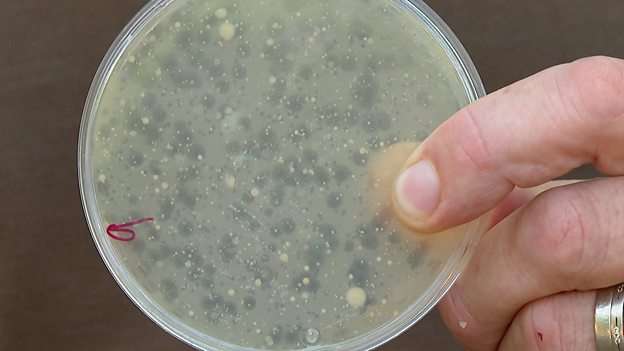本集内容
Could zoo poo hold the key to fighting infection?
动物园动物的粪便能为我们带来对抗感染的解药吗?
文字稿
You might think it odd but zoos are asked for dung samples all the time for all sorts of scientific research.
你也许会觉得这很奇怪,但动物园总是会收到让他们提供粪便样本以供各种科学研究使用的请求。
The zoo just has to collect it up and then post it out.
动物园只需要把粪便收集起来然后寄出去。
Fran Lovell, Dudley Zoo
"So we did have one focused on our lovely otters, and that had to be packaged up in tinfoil. Now otter poo is not the most solid, so it's a little bit tricky to package up into that tinfoil, but that was to make sure that the study was scientifically viable."
弗兰·洛维尔 达德利动物园
“曾经有一个项目主要研究的是我们动物园里这些可爱的水獭,那个项目要求我们把粪便用锡箔纸包装好。水獭的粪便不是固体,所以想要用锡纸把它包好有点困难,但这也是为了确保研究切实有效,符合科学要求。”
At Dudley Zoo, a team from Leicester University wanted poo from every single animal because inside that poo, you can find bacteriophages, or phages for short, and phages could be vital in helping doctors fight infections in people, which is something that's getting harder to do.
在达德利动物园,一个来自莱斯特大学的研究团队想获得每一种动物的粪便,因为在这些粪便中能找到噬菌体,也就是 “phages”。噬菌体对于帮助医生对抗人体中的感染十分重要,而抗感染正变得愈发困难。
Dr Andrew Millard, University of Leicester
"We are running out of antibiotics, so we need new treatments, and one of these treatments are bacteriophages because they're extremely efficient at killing bacteria."
安德鲁·米勒德博士 莱斯特大学
“人类可用的抗生素越来越少,所以我们需要新疗法,而其中一种新疗法就是噬菌体,因为它们能极其高效地杀菌。”
And as a treat, some of the petri dishes from this big phage hunt have made the journey from the lab back to the zoo.
作为给动物园的回报,一些用于寻找和研究噬菌体的培养皿又从实验室被送回了动物园。
David Gregory Kumar, BBC correspondent
"And those phages have cleared those little spaces."
戴维·格雷戈里·库马尔 BBC 通讯员
“噬菌体杀死了这些小小的空白区域内的细菌。”
Dr Andrew Millard, University of Leicester
"Yes."
安德鲁·米勒德博士 莱斯特大学
“是的。”
David Gregory Kumar, BBC correspondent
"Can I pick… is it OK to pick that up?"
戴维·格雷戈里·库马尔 BBC 通讯员
“我能把它拿起来吗?”
Dr Andrew Millard, University of Leicester
"Yeah, yeah, yeah. It stinks but it's allowed."
安德鲁·米勒德博士 莱斯特大学
“当然可以,没问题。它闻着臭极了但你可以把它拿起来。”
David Gregory Kumar, BBC correspondent
"OK they are a bit whiffy, but also promising."
戴维·格雷戈里·库马尔 BBC 通讯员
“好吧,它们的味道有些难闻,但这些培养皿中所呈现的实验结果也备受期待。”
David Gregory Kumar, BBC correspondent
"Inside this dish then, there is bacteria all across it, and any gaps are caused by the phage from, in this case, skink poo. And that means if this bacteria was causing an infection inside you, this might be a phage that could help you fight it off."
戴维·格雷戈里·库马尔 BBC 通讯员
“这个培养皿中布满了细菌,所有这些空缺的部分都是由噬菌体杀死细菌所形成的,这个培养皿中的噬菌体来自石龙子。这个实验结果表明,如果这种细菌在你的体内造成了感染,那么相应的噬菌体可能就能帮助你对抗它。”
The aim is to create a massive library of potential new treatments.
这项研究的目标是创造一个包含潜在新疗法的大型资料库。
Dr Andrew Millard, University of Leicester
"In ten years' time, what we want to have is a big collection of bacteriophages that we can come along and we can select the best one to treat a bacterial infection, so patients can be treated."
安德鲁·米勒德博士 莱斯特大学
“我们想用十年时间建立一个噬菌体的大型收藏,这样我们就可以到这个收藏中挑选治疗某种细菌感染的最佳噬菌体,从而让病人得以被治愈。”
And while we're here, we might as well fill up the animals to help the next scientist who needs to have a poke around zoo poo.
既然我们都来到动物园了,何不帮忙喂养一下这些动物们,帮助下一个需要在动物园动物的粪便中翻找的科学家吧。

